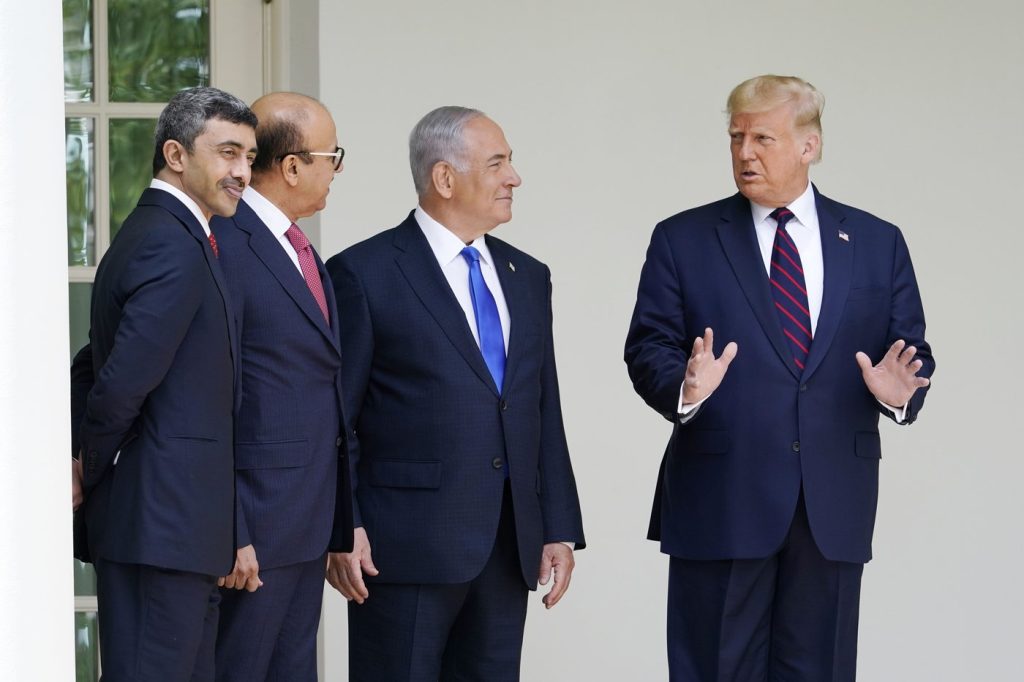DOHA, Qatar (AP) — Just a few months ago, the rulers of Saudi Arabia, the United Arab Emirates (UAE), and Qatar welcomed U.S. President Donald Trump with camel parades and grand celebrations in their palaces. However, the mood has dramatically shifted as these leaders now express unified anger following Israel's recent airstrike in Qatar’s capital, targeting Hamas leaders. Saudi Crown Prince Mohammed bin Salman has called for "an Arab, Islamic and international response to confront the aggression" and deter Israel's "criminal practices."
The UAE's Sheikh Mohammed bin Zayed Al Nahyan made a notable visit to Qatar, embracing its ruling emir, an act that was unthinkable a few years ago when the UAE and Saudi Arabia led a boycott against Qatar, accusing it of supporting terrorist groups—an allegation strongly denied by Doha. Sheikh Mohammed condemned Israel's strike as a violation of "all international laws and norms."
This incident has heightened fears among leaders in the oil-rich Gulf nations, who worry that the United States might abandon its longstanding commitment to protect them against regional aggressors, similar to the threats posed by former Iraqi dictator Saddam Hussein and, more recently, Israeli Prime Minister Benjamin Netanyahu. Such fears could hinder Trump's regional priorities, including efforts to end the conflict in Gaza, expand his Abraham Accords—which established ties between Israel and several Arab countries—and counter increasing Chinese and Russian influence.
In the aftermath of the strike, Trump has seemingly registered the discontent of Gulf leaders, distancing himself from the attack by stating that it "does not advance Israel or America’s goals" and reassuring Qatar that such actions would not be repeated. Nevertheless, Trump’s unwavering support for Israel amid these escalating tensions raises concerns among Gulf states.
Qatar's Prime Minister, Sheikh Mohammed bin Abdulrahman Al Thani, lambasted the airstrike as an act of "state terror" and directly accused Netanyahu of "barbarism." He expressed skepticism about Qatar's ongoing mediation efforts, claiming there was nothing "valid" about current negotiations after the strike, which killed at least five Hamas members and a member of Qatar's security forces while they were assessing a U.S. ceasefire proposal.
Netanyahu has threatened further strikes if Qatar continues to harbor Hamas, which it has done for years with U.S. knowledge and support. "I say to Qatar and all nations who harbor terrorists, you either expel them or bring them to justice, because if you don’t, we will," Netanyahu stated, drawing condemnation from the UAE's foreign ministry. The ministry remarked that aggression against any member of the Gulf Cooperation Council (GCC)—which includes both the UAE and Qatar—constitutes an attack on the collective Gulf security framework.
The UAE had previously been the driving force behind the 2020 Abraham Accords, which normalized relations between Israel and several Arab nations in agreements brokered by Trump. While these relationships have remained intact amid regional upheavals, their stability is now in jeopardy if Israel continues its current course. Last week, the UAE warned that any attempt to annex the occupied West Bank would crossed a "red line," although it did not specify potential reactions.
The push for normalization with Saudi Arabia, a key regional power, seemed imminent before the onset of Hamas’ attack on October 7, 2023. Saudi Arabia stipulates that normalization with Israel can only occur if a path for an independent Palestinian state is established. The current Israeli government and its political class are largely opposed to such a state, perceiving it as rewarding Hamas, which complicates diplomatic negotiations.
Crown Prince Mohammed has maintained his stance, accusing Israel of "genocide" last year and pursuing warmer ties with Iran, a traditional adversary. Despite this, all three Gulf nations have substantial incentives to uphold the security agreements established with the United States following the 1991 Gulf War, which involved hosting American military bases in exchange for protection against regional threats. However, the recent Israeli strike is viewed as a severe breach of trust that could complicate future diplomatic dealings.











